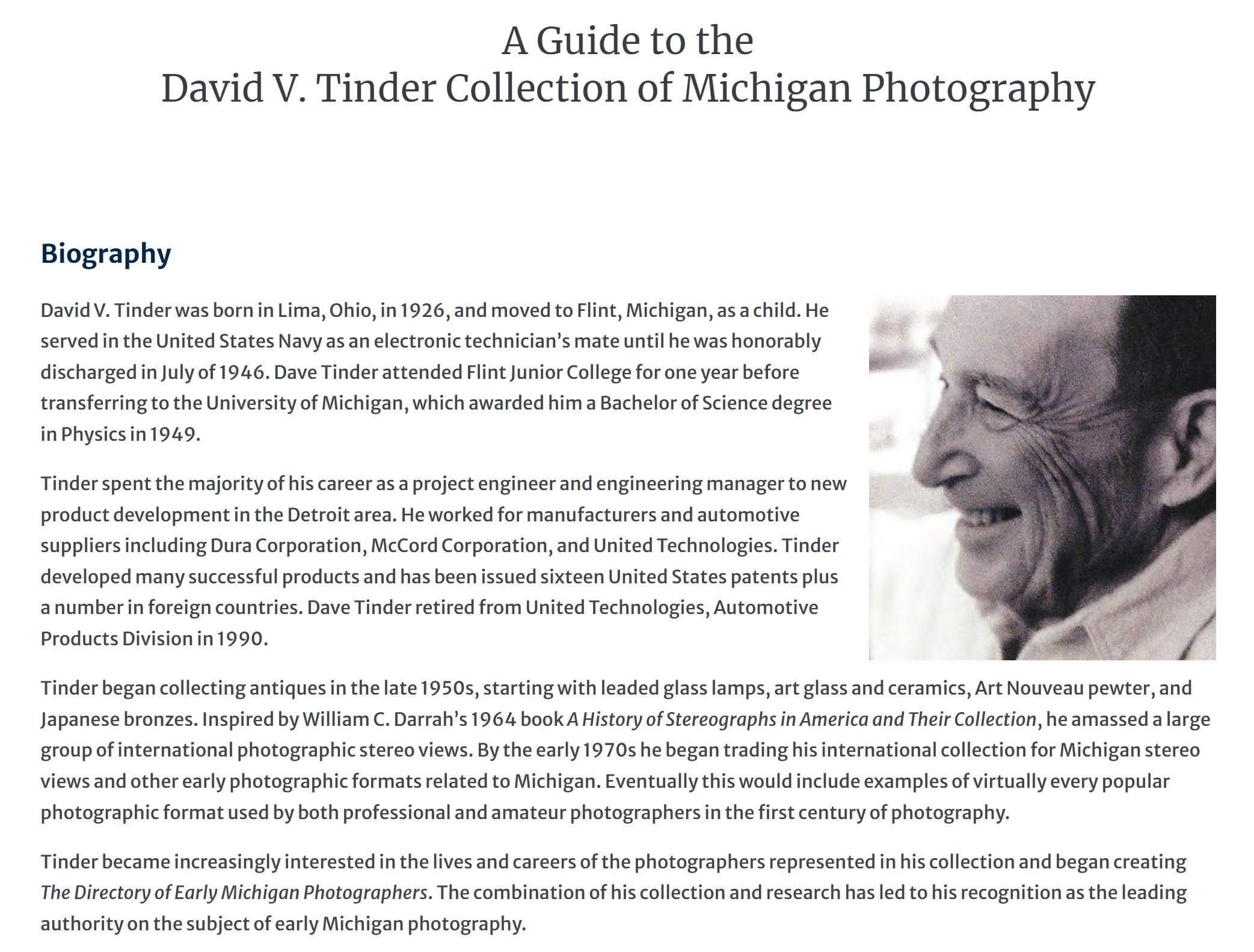The Historical Society of Greater Lansing is hosting an educational program on “Tinder,” 7 p.m., Thursday, March 16 at the Library of Michigan, Lake Erie Room, 702 West Kalamazoo St. The event is free and parking is adjacent to the Library.
To be clear the program is not about the on-line dating site, but it is about the David V. Tinder Collection of Michigan Photography of more than 100,000 photographs held at the Clements Library at The University of Michigan. Clayton Lewis, curator of the collection, will present a program on Tinder - the photo collection - not the dating site and show how it can be used to identify more details about a coveted family photograph and the photographer who took it.
Tinder was born in Lima, Ohio, in 1926, and moved to Flint, Michigan, as a child. He graduated from the University of Michigan, in 1949 with a degree in Physics. He spent most of his career as a project engineer and engineering manager working for Dura Corporation, McCord Corporation, and United Technologies. He held 16 United States patents plus a number in foreign countries.
Tinder began collecting antiques in the late 1950s, starting with leaded glass lamps, art glass and ceramics, Art Nouveau pewter, and Japanese bronzes. Inspired by William C. Darrah’s 1964 book A History of Stereographs in America and Their Collection, he amassed a large group of international photographic stereo views. By the early 1970s he began trading his international collection for Michigan stereo views and other early photographic formats related to Michigan. Eventually this would include examples of virtually every popular photographic format used by both professional and amateur photographers in the first century of photography.
Tinder became interested in the lives and careers of the photographers represented in his collection and began creating The Directory of Early Michigan Photographers. The combination of his collection and research has led to his recognition as the leading authority on the subject of early Michigan photography.
The Tinder Collection consists of more than 100,000 images in a variety of formats including daguerreotypes, ambrotypes, tintypes, cartes de visite, cabinet photographs, real photo postcards, stereographs, and mounted and unmounted paper prints.
The collection is primarily made up of vernacular photographs of everyday life in Michigan taken by both professional and amateur photographers from the 1840s into the mid-twentieth century. In addition to supporting local history research, the collection has resources for the study of specific events and subjects. Included are images related to lumbering; mining; suburbanization; the industrialization of cities; travel and transportation; the impact of the automobile; the rise of middle-class leisure society; fashion and dress; ethnicity and race; the role of fraternal organizations in society; and the participation of photographers in business, domestic, and social life. The collection is only partially open for research.
This reference work contains biographical information about virtually every known commercial and significant amateur photographer in the state of Michigan from the first known appearances in the 1840s into the early twentieth century.
Because the collection is so large much of it is still being catalogued; however the list of photographers, their hometown, their years of operation and detailed biographies are available on line at https://clements.umich.edu/files/tinder_directory.pdf
Lewis will walk people through how they can use the on-line catalog to help identify the history of family photographs and narrow down where and when they were taken.
The online resource is the most valuable research resource on Michigan Photographers ever compiled.
Read more about the collection here: David V. Tinder Collection of Michigan Photography - UM Clements Library (umich.edu).
The Tinder program is part of a lecture series on Michigan Photography being hosted by the Historical Society and the Library of Michigan in conjunction with the current exhibition on Michigan panoramic photography featuring 53 dramatic photographs from across the state.
Back to All Events



